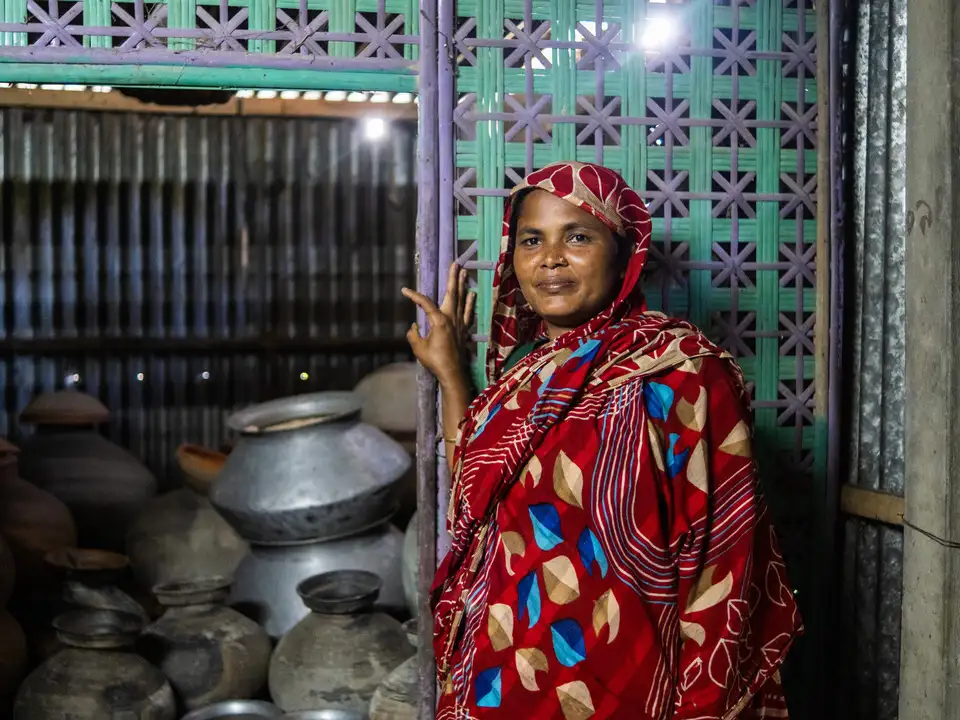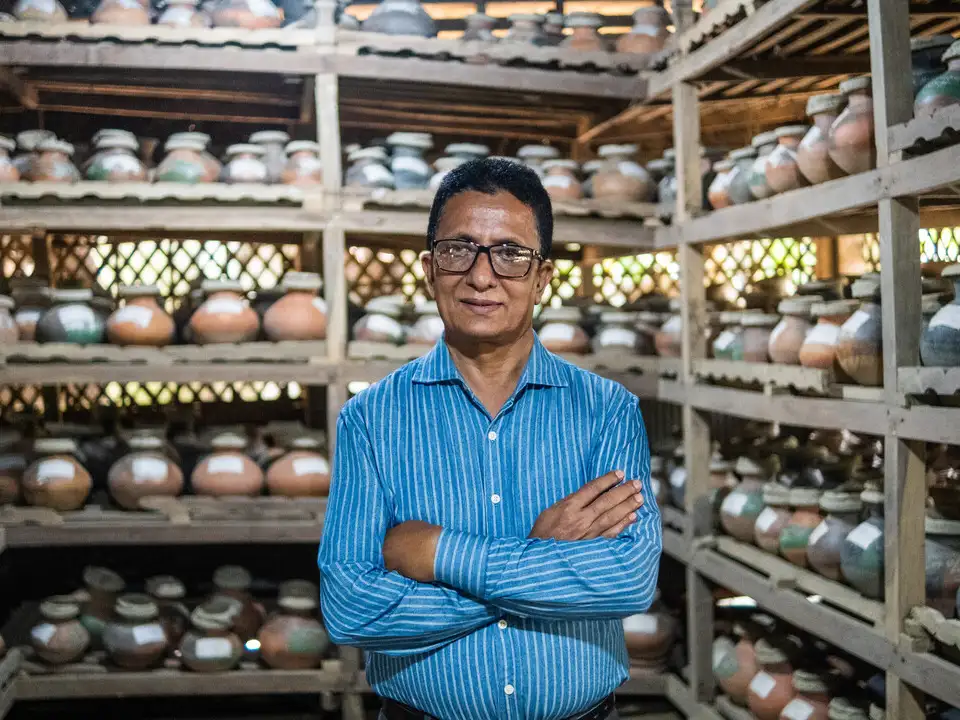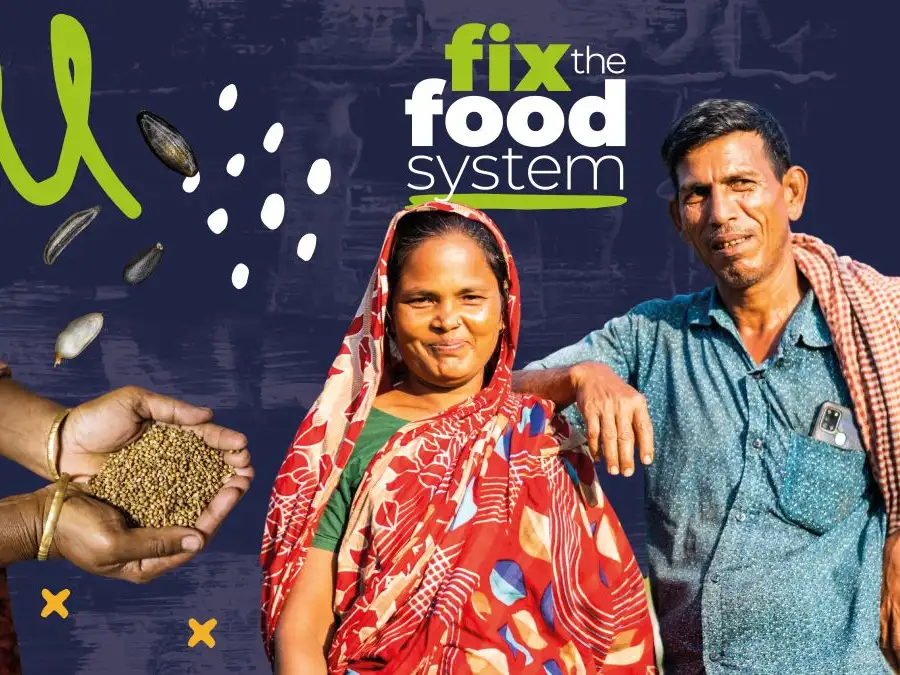

Salina standing next to her seed store room
Seed sovereignty is the right of farmers to save, use, exchange and sell their own seeds. It means farmers can choose the seeds they plant, what to grow and how to farm.
Here are 5 reasons why seed sovereignty is vital for our global food system.
1. When we limit access to seeds, we limit the food we produce
For generations, small-scale farmers have freely shared a wide variety of seeds to produce the food that feeds a significant proportion of the world’s population.
However, new laws are being introduced across the world which limit what they can do with their own seed varieties. In recent years, more and more countries including Ghana, Liberia and Sierra Leone have introduced laws that prevent farmers from choosing what seeds they can plant on their own land. These laws have been insisted on by the World Bank in exchange for financial support yet have the consequence of harming those most in need.
The loss of seed variety
Out of 6,000 edible plant species that we have cultivated over centuries, just nine crops now account for more than 65% of all crop production.
As a result, small-scale farmers are facing increasing pressure to buy seeds from the limited selection produced by big corporations. This locks them into a model that serves the global market, but not their own communities and it means a drastic reduction in the variety of crops produced.
2. Big corporations controlling seeds is bad for food security
Behind our loss of crop diversity is the industrial model of agriculture that has witnessed increasing concentration of control in the hands of a few giant agribusiness corporations.
Corporate control
In the 1980s, the ten biggest companies controlled less than 15% of the global seed market. Today that control is concentrated in the hands of just four companies - Bayer, Corteva, BASF and Syngenta – who control 50% of the market. This means that just a handful of private companies own half of one of the most precious resources needed to feed the world.
As corporations focus on crops that are most likely to return larger profits, this has exacerbated the loss of crop diversity.
This lack of crop diversity makes the global food system very fragile to shocks including climate change, conflict, and disease. We just need to look at Russia’s war in Ukraine to see the impact this has had on the price of key staples such as wheat and overall food prices.
By way of an alternative, small scale farmers’ seeds are ‘genetically diverse’. This means that crops can adapt to their environment, develop resistance to pests and diseases, and evolve in response to changing conditions created by climate change.


Jahangir Alam Jony (known as 'Jony'), Director of Ubinig, inside UBINIG's Community Seed Wealth Centre in Tangail.
3. Access to a variety of seeds increases climate resilience
The Intergovernmental Panel on Climate Change (IPCC) has stated that access to diverse seeds is a key strategy to ensure we are able to continue to produce the food we need as climate change impacts become more severe.
Over hundreds of years, small-scale farmers have developed a huge diversity of plant varieties that respond to their specific local climate and soil conditions. When they can freely access seeds and build on this diversity it means they develop resilience to climate change.
Any threat to seed sovereignty will mean we are less resilient to a changing climate which increases vulnerability in the food system in an age of extreme weather events.
4. Free access to seeds supports women
Women account for almost half of the world’s small-scale farmers, and in Africa they produce 70% of the food eaten across the continent.
They often play a vital role when it comes to saving seeds. But when countries adopt new seed laws, women’s access to seeds is potentially reduced. In many countries, women may face cultural barriers stopping them going to markets where commercial varieties are sold. They also often have less access to finance to buy seeds in commercial markets, and commercial breeders often do not produce seeds for the crops that women grow for home consumption.
When the men need seeds to sow they go to the women and ask ‘please, give me seeds from your store.’ This is how it used to be, but as chemical agriculture took over, this bond broke. The male farmers no longer ask for anything from the women. They just go to the market and buy the seeds. So, the relationship broke down, and women lost their empowerment.
5. Corporate seeds depend on expensive and dangerous extras
Commercial seeds often produce higher yields than farmers’ own varieties, but only when expensive inputs such as fertilisers and pesticides are applied.
Shifting to commercial seeds and chemicals inputs is expensive business and is often beyond the reach of many small-scale farmers. This can leave farmers in financial trouble or unmanagable debt.
In addition, the chemicals needed to grow commercial seeds are both environmentally damaging and dangerous to human health. Pesticides are responsible for as many as 385 million cases of poisoning and at least 11,000 deaths each year across the world.
Salina, a seed saver from Bangladesh says: “…Sometimes the company people come here just to buy our organic produce for their own consumption! They are selling the chemicals, but for themselves they buy organic produce…”
Will you help us to support farmers in the fight to keep their rights to their own seeds?

Fix the Food System
Our global food system is broken. Over 800 million people go hungry, and the way we produce much of our food harms our planet.
Seeds are at the very heart of the food system. They are part of nature and given by God for the benefit of all, but increasingly farmers’ rights to choose their own seeds are under threat.

